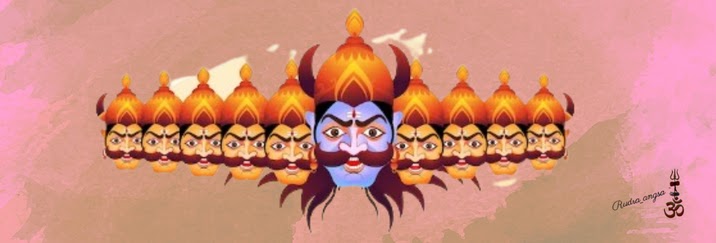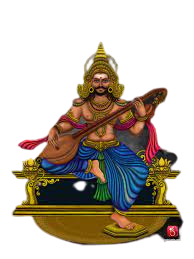Ten-Headed Ravana The Multi-Dimensional Character in Hindu Philosophy
Ravana is a prominent figure in Hindu mythology and is best known as the antagonist in the epic Ramayana. But the character of Ravana is multidimensional and is not limited to being just a villain. In this article, we will explore the role of Ravana in Hindu philosophy and spirituality and understand his importance in Hinduism.
Who is Ravana?
Ravana is a character in the Hindu epic Ramayana, which tells the story of Lord Rama's battle against Ravana. According to Hindu mythology, Ravana was a mighty king of Lanka and was considered one of the most learned and scholarly persons of his time. He was a devout follower of Lord Shiva and was a great musician and poet.
Ravana's arrogance and arrogance led to his downfall. He abducted Lord Rama's wife Sita, which led to the great war between Rama and Ravana. With the help of Hanuman and his army of monkeys, Rama defeats Ravana and rescues Sita.
Role of Ravana in Hindu Philosophy
The character of Ravana is not limited to being an antagonist in the Ramayana. He is considered a complex character and has an important role in Hindu philosophy.
In some Hindu traditions, Ravana is worshiped as a deity. Ravana is considered a great devotee of Lord Shiva and is considered a symbol of wisdom, power, and wealth. In some regions of India, Ravana is worshiped during the festival of Navratri.
In Hinduism, Ravana is also seen as a symbol of arrogance and ignorance. His downfall has been attributed to his arrogance and inability to control his desires. The character of Ravana is used as an example to show the consequences of indulging in materialistic desires and not following the path of righteousness.
Significance of Ravana in Hindu Spirituality
The character of Ravana is also important in Hindu spirituality. Ravana is seen as a symbol of the human mind, which is constantly battling with desires and temptations. His ten heads are seen as a representation of the ten senses of the human body, which are difficult to control.
The defeat of Ravana by Lord Rama is seen as the victory of good over evil and righteousness over unrighteousness. It is believed that by reciting the Ramayana, one can overcome the negative aspects of the mind, such as the ego and desires, and attain spiritual liberation.
The character of Ravana is multifaceted and has an important role in Hindu philosophy and spirituality. He is worshiped as a deity, seen as a symbol of wisdom, power, and wealth, and also as a representation of the human mind. His downfall is attributed to his arrogance and inability to control his desires, which is used as an example to show the consequences of indulging in materialistic desires and not following the path of righteousness.
Ravana's influence on traditional Indian music and dance
Ravana, the demon king of Lanka from Hindu mythology, has exerted a significant influence not only on Indian literature and art but also on traditional Indian music and dance. Her character and story have been a popular subject in various Indian classical art forms, inspiring musicians and dancers.
Ravana is known for his exceptional skill as a musician and is believed to have invented the 'Ravanahatha', a stringed musical instrument. The instrument is still played in some parts of India, and its unique sound is associated with the musical prowess of Ravana. The story of Ravana has also been adapted into various dance forms. The traditional Indian dance form of 'Kathakali' has a unique Ravana mask, and his character has been featured in many dance dramas. The classical dance form of 'Bharatanatyam' also features Ravana in its repertoire, where his fierce persona is highlighted through intricate footwork and expressive hand gestures.
Ravana's influence can also be seen in the Indian folk music of some regions, where his character is revered as a powerful deity. Odisha's 'Ravana Chhaya dance drama depicts Ravana as a hero who fights against injustice and oppression. Ravana's influence on traditional Indian music and dance is not limited to his character alone. His story and the epic battle of the Ramayana have been popular themes in Indian classical music compositions. The 'Ravana Samhita', a text attributed to Ravana, is also an important source of knowledge in Indian classical music theory.
The character and story of Ravana have played an important role in shaping traditional Indian music and dance. His musical prowess and invention of the 'Ravanahath' has left a lasting impact on Indian music, while his depictions of various dance forms have inspired generations of dancers. The epic battle of the Ramayana and the story of Ravana remains popular theme in Indian classical music and dance compositions.
The literary representation of Ravana in Indian literature
Ravana, the demon king of Lanka, has been a popular figure in both ancient and modern Indian literature. Her complex character and story have inspired many writers and poets, leading to various interpretations and representations.
In the ancient Indian epic, the Ramayana, Ravana is portrayed as a powerful and evil character who abducts Sita, the wife of Lord Rama. With various retellings and adaptations of the story, the epic has had a significant influence on Indian literature. These retellings explore Ravana's character in depth, with some authors portraying him as a tragic hero while others highlight his villainous side. Ravana has been depicted in various forms in modern Indian literature. Bengali writer, Bankim Chandra Chatterjee wrote the novel 'Anandmath', which depicts a group of rebels fighting against British rule with Ravana as a symbol of their resistance. The novel explores the character of Ravana as a symbol of rebellion against oppression.



